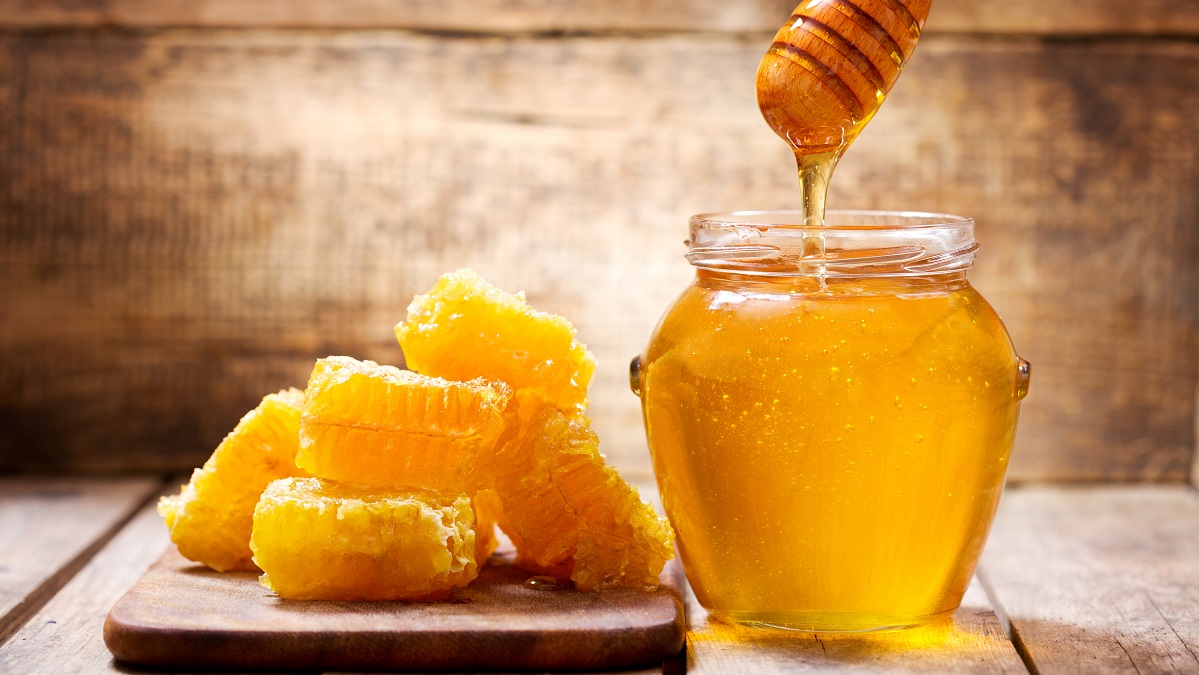We’re constantly told too much sugar is bad for us, but what about honey? There’s good news on that front for those with a sweet-tooth. A new study found honey could be the healthiest sweetener and may be good for cardiometabolic health.
The University of Toronto study, involving 1105 individuals, showed that honey lowered fasting blood glucose (blood sugar levels on an empty stomach), total cholesterol and ‘bad’ cholesterol, as well as a marker of fatty liver disease.
But – you knew there would be a ‘but’, didn’t you? – there is a catch. The 1105 individuals involved were assessed as being “predominantly healthy” and on a diet in which no more than 10 per cent of their daily calories come from sugar.
Read: Sugary diet linked to fatty liver disease in non-drinkers
If that happens to be you, then including honey – particularly raw, monofloral honey – may well help you be healthier still.
Is honey the healthiest sweetener?
Honey has two advantages over most other sweeteners. First, honey’s key sweetening agents are not the usual fructose and glucose found in other sugars. They are a combination of rarer sugars, including isomaltulose, kojibiose, trehalose and melezitose.
These sugars don’t just sound more scientific. They have a host of physiological and metabolic benefits, including improving glucose response, reducing insulin resistance and promoting the growth of bacteria needed for a healthy gut.
Read: Food and drink is getting sweeter, but it’s not all sugar
But there’s more, according to study co-author Dr Tauseef Ahmad Khan. Honey, Dr Khan says, contains much more than sugars, such as “many bioactive molecules, including polyphenols, flavonoids and organic acids that have an array of pharmacological properties including antibiotic effect, anti-cancer effect, anti-obesogenic [anti-obesity] effect, protection against free radical damage and reducing inflammation, etc.”
That makes for some pretty compelling evidence to ditch your regular sweeteners in favour of raw honey.
‘Raw’ and ‘monofloral’ honey?
While you might usually associate the term ‘raw’ with meat products, raw honey is a ‘thing’. The majority of honeys you’ll see on supermarket shelves have been pasteurised, meaning they’ve been heated to 70°C or higher.
Milk is pasteurised for safety reasons (the process kills harmful germs). Commercial honey is pasteurised to make it easier to pour and look a little clearer.
Raw honey has an array of nutrients, including many antioxidants, which may diminish in quantity when honey is pasteurised.
Read: Spiced Honey Cake
As for monofloral honey, as the name suggests, it is derived exclusively from the bee-collected nectar of a single type of plant – sometimes even a single plant. Supermarket honeys are usually derived from collected nectar from any nectar-producing plants within a three to six kilometre range from the hive.
According to the study, clover and robinia monofloral honeys lowered LDL cholesterol and overall cholesterol, as well as fasting triglycerides. Clover honey also reduced fasting glucose levels.
All in all, the news is good for honey-lovers. That’s not to say you go and whip up a batch of honey joys and devour the lot, but if you can use honey in place of your other regular sweeteners, you might be getting the benefit of improved health along with satisfied taste buds.
Are you a honey lover? Would you be prepared to swap other sugars in your diet for raw honey? Why not share your thoughts in the comments section below?


I absolutely LOVE honey!
I use it for sweetening everything instead of sugar.
Plus, I take it off the spoon any time during the day to help reduce my post-cancer-treatment severe chronic pain that opiods only help to a degree.
And also last thing at night to help me sleep.
I nod off almost immediately and again in the night if I wake for a bathroom visit.
Now in my mid 70s, I have been receiving the benefits of honey for over 50 years.
I read a statement in a magazine by Lelord Kordel, who said “Honey reduces blood phosphorus levels which are high when pain is present.” so, not knowing whether that was true or false, I thought I’d try it.
It worked for me – and has ever since! I have mentioned that to a few people, who said it didn’t work for them, and ‘it’s all in my brain!”
My answer was “Well, pain is in my brain, too, so I’ll stick with it!”
https://en.wikipedia.org/wiki/Lelord_Kordel
I made the shift away from sugar (brown, white and raw) a couple of years ago simply stopping using them in tea, milo and on my porridge. The only one where I now use an additional sweetener is on my porridge where I now use a dribble of honey.
Recently just as I was about to write honey on the shopping list, my brother walked in with 500gms of honey freshly harvested from his hive. Pure bush honey. Deep and dark and tasty.
Has the honey made a change to my health? Impossible to tell as I also cut out nearly all of my chocolate consumption as well.
My mother used to have up to 10 hives in her garden as my in-laws of the time were apiarists and her garden was a welcome R&R location for the bees from country Qld. Due to the encroachment of suburbia, those hives had to go. But for those years we often received a diverse range of different flavoured honeys reflecting the locations of the country hives.
The garden honey was a flavour of it’s own also in keeping with the changing flowers through the seasons.
If you can, buy your honey straight from the apiarist at places such as country and farmers markets. There is no Use by date on honey and it will keep for years with no deterioration in quality. It can be added to almost all cooking to add or enhance flavour. It can also help as a preservative.